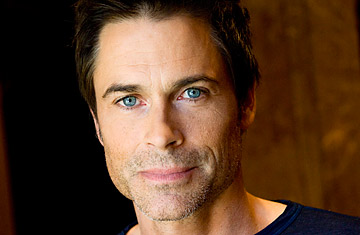
Actor Rob Lowe, author of Stories I Only Tell My Friends
I love celebrity memoirs, and not in an ironic way. I don't love them because they're campy. I hate camp. I don't love them because they're full of Hollywood gossip. I'm not interested in Hollywood gossip. Even though I work for Time Inc. and the profits from People magazine probably pay most of my salary. I love them and read them because they are, to me, existential fairy tales about one human being's triumph over the all-corrupting force of entropy. And I mean that seriously.
It doesn't particularly matter to me who the celebrity is. I have read Andre Agassi's memoir and Monica Seles' memoir, but I have also read Anthony Kiedis' memoir and Tommy Lee's memoir (even though I couldn't have told you what band Tommy Lee was in, or even what instrument he played in it). I've read Paul Allen's memoir. I've read Rutger Hauer's memoir (All Those Moments: Stories of Heroes, Villains, Replicants and Blade Runners), in which we learn that Hauer wanted Matthew Broderick to play his character in Ladyhawke as more of "an androgynous Annie Lennox thing," but no such luck.
I may be the only person who read Glen Matlock's memoir. He was the original bassist for the Sex Pistols. You know, before Sid Vicious. He was kicked out for being too boring. I read his memoir.
I didn't intend to read Rob Lowe's new memoir, Stories I Only Tell My Friends. But an advance copy crossed my desk, and I picked it up to skim it for the racy part in which he gets caught on video with two underage girls. I was also vaguely curious about why he left The West Wing for that show about the lawyer that flopped after like two episodes. Then, just like that, it was over, and I'd read the whole thing. And you know what? I really enjoyed it. Like Edith Piaf (author of The Wheel of Fortune: The Autobiography of Edith Piaf), je ne regrette rien.
Lowe had a crap childhood. Many celebrities do; in fact, the crap childhood is one of the cherished conventions of the celebrity memoir. This may be because it's necessary to have a crap childhood to acquire the bizarre personality type you need to become a celebrity: wounded and insecure enough to require massive amounts of attention from other people, yet aggressive and determined enough to crush everyone else who wants to become a celebrity in your place. However he did it, Lowe acquired it.
He did this starting in Dayton, Ohio, where he was a drama geek who acted in community theater and doorstepped celebrities when they were in town (including a kindly Liza Minnelli and an indifferent Telly Savalas). His parents divorced when he was 5 — well timed for maximum damage. When Rob was 12, his mom (who struggles with her mental health throughout the book) left her second husband and took the family to Malibu, Calif.
In Malibu we encounter another great convention of the celebrity memoir: the Zelig effect. It's a strange reality of the lives of future celebrities that everybody they meet seems to be a future celebrity too. There must be a statistical explanation for it — it's an illusion generated by hindsight — but who knows, maybe celebrities naturally occur in clumps. Like cancer clusters.
Whatever the reason, Lowe's memoir has the Zelig effect in spades. When young Rob runs into a bunch of kids running around in a parking lot, they turn out to be Charlie Sheen, Emilio Estevez and Chris Penn (whose brother Sean is around as well). A guy Lowe randomly meets at a baseball game works for The Muppet Show and introduces him to Bernie Brillstein (who will one day manage him) and John Belushi. Lowe's mom's new boyfriend's brother and sister-in-law take him to a smelly warehouse where they happen to be doing special effects for this weird new movie called Star Wars. (A rancid bantha costume is the source of the smell.) The guy who beats Lowe in a track race grows up to be Dean Cain. The guy he shoots an early commercial with, for a hamburger chain, is a rookie news anchor named Regis Philbin. Janet Jackson makes a cameo, as do Ron Howard, LeVar Burton, Sarah Jessica Parker ... you get the idea. Oh, and a girl he dates turns out to be Cary Grant's daughter.
(If I have one complaint about Stories I Only Tell My Friends, it's that Lowe succumbs to yet another great convention of the celebrity memoir, which is to complain about how he used to be a nerd. I'm sorry, but nobody who played sports and was that supernaturally good-looking was ever a nerd. For God's sake, he lost his virginity, untraumatically, at 14.)
